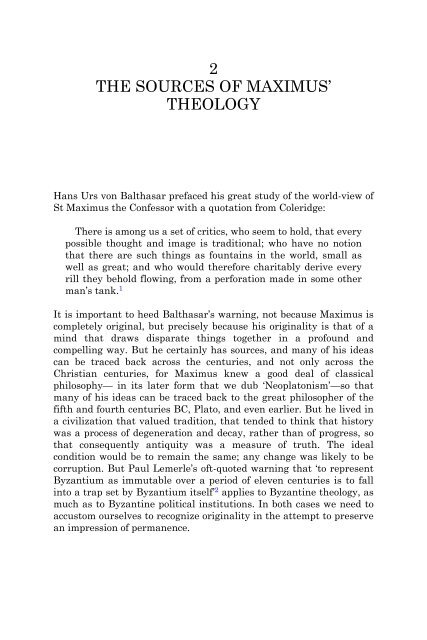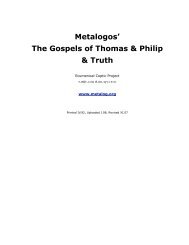- Page 2 and 3: MAXIMUS THE CONFESSOR St Maximus th
- Page 4 and 5: MAXIMUS THE CONFESSOR Andrew Louth
- Page 6 and 7: CONTENTS Preface vi Abbreviations v
- Page 8 and 9: the densest of his theological trea
- Page 10: Introduction
- Page 13 and 14: 4 INTRODUCTION Belgrade: in 584), a
- Page 15 and 16: 6 INTRODUCTION result of an adulter
- Page 17 and 18: 8 INTRODUCTION state eternally from
- Page 19 and 20: 10 INTRODUCTION no division, no sep
- Page 21 and 22: 12 INTRODUCTION THE SEVENTH-CENTURY
- Page 23 and 24: 14 INTRODUCTION nature of the theol
- Page 25 and 26: 16 INTRODUCTION abandoned the hope
- Page 30 and 31: THE SOURCES OF MAXIMUS’ THEOLOGY
- Page 32 and 33: THE SOURCES OF MAXIMUS’ THEOLOGY
- Page 34 and 35: THE SOURCES OF MAXIMUS’ THEOLOGY
- Page 36 and 37: THE SOURCES OF MAXIMUS’ THEOLOGY
- Page 38 and 39: THE SOURCES OF MAXIMUS’ THEOLOGY
- Page 40: THE SOURCES OF MAXIMUS’ THEOLOGY
- Page 43 and 44: 34 INTRODUCTION the practice of the
- Page 45 and 46: 36 INTRODUCTION kind of academic st
- Page 47 and 48: 38 INTRODUCTION THE WAY OF LOVE 10
- Page 49 and 50: 40 INTRODUCTION attachment to the t
- Page 51 and 52: 42 INTRODUCTION that continually ri
- Page 53 and 54: 44 INTRODUCTION necessity of asceti
- Page 55 and 56: 46 INTRODUCTION to another and buil
- Page 57 and 58: 48 THE DOCTRINE OF THE PERSON OF CH
- Page 59 and 60: 50 THE DOCTRINE OF THE PERSON OF CH
- Page 61 and 62: 52 THE DOCTRINE OF THE PERSON OF CH
- Page 63 and 64: 54 THE DOCTRINE OF THE PERSON OF CH
- Page 65 and 66: 56 THE DOCTRINE OF THE PERSON OF CH
- Page 67 and 68: 58 THE DOCTRINE OF THE PERSON OF CH
- Page 69 and 70: 60 THE DOCTRINE OF THE PERSON OF CH
- Page 71 and 72: 62 INTRODUCTION Conversely the huma
- Page 73 and 74: 64 INTRODUCTION original equality a
- Page 75 and 76: 66 INTRODUCTION to Maximian as to O
- Page 77 and 78:
68 INTRODUCTION clear and limpid to
- Page 79 and 80:
70 INTRODUCTION Difficulty 41 is bu
- Page 81 and 82:
72 INTRODUCTION liturgy, but other
- Page 83 and 84:
74 INTRODUCTION vision, when our Go
- Page 86 and 87:
GENERAL INTRODUCTION TO THE TEXTS A
- Page 88:
GENERAL INTRODUCTION 79 all modern
- Page 91 and 92:
82 LETTER 2 human person, revealing
- Page 93 and 94:
84 LETTER 2 D 397A B C grace, throu
- Page 95 and 96:
86 LETTER 2 401A C D B Perhaps it w
- Page 97 and 98:
88 LETTER 2 C D 405A B particular t
- Page 99 and 100:
90 LETTER 2 B and the same thing, t
- Page 101 and 102:
92 DIFFICULTY 10 veil describes for
- Page 103 and 104:
94 DIFFICULTY 10 1108A B C 1 Introd
- Page 105 and 106:
96 DIFFICULTY 10 D 1112A B C to mak
- Page 107 and 108:
98 DIFFICULTY 10 C D 1116A Spirit o
- Page 109 and 110:
100 DIFFICULTY 10 C unshakeable lan
- Page 111 and 112:
102 DIFFICULTY 10 D 1121A B 9 Conte
- Page 113 and 114:
104 DIFFICULTY 10 C D 1125A finding
- Page 115 and 116:
106 DIFFICULTY 10 1128A B C diligen
- Page 117 and 118:
108 DIFFICULTY 10 D 1132A B by natu
- Page 119 and 120:
110 DIFFICULTY 10 B C D 1136A diffe
- Page 121 and 122:
112 DIFFICULTY 10 1137A B C into th
- Page 123 and 124:
114 DIFFICULTY 10 D 1141A B their c
- Page 125 and 126:
116 DIFFICULTY 10 C D 1145A B which
- Page 127 and 128:
118 DIFFICULTY 10 B C D 22 Twofold
- Page 129 and 130:
120 DIFFICULTY 10 D 1152A B invisib
- Page 131 and 132:
122 DIFFICULTY 10 C D 1156A circums
- Page 133 and 134:
124 DIFFICULTY 10 1157A B C corrupt
- Page 135 and 136:
C D 1161A 126 DIFFICULTY 10 B 31 Fu
- Page 137 and 138:
128 DIFFICULTY 10 B C D 1165A which
- Page 139 and 140:
130 DIFFICULTY 10 1168A B C through
- Page 141 and 142:
132 DIFFICULTY 10 C D 1172A B sense
- Page 143 and 144:
134 DIFFICULTY 10 B 1176B C D heap.
- Page 145 and 146:
D 1180A 136 DIFFICULTY 10 B limitle
- Page 147 and 148:
138 DIFFICULTY 10 C D 1184A B uncir
- Page 149 and 150:
B C D 1188A 140 DIFFICULTY 10 compa
- Page 151 and 152:
142 DIFFICULTY 10 B C D with the in
- Page 153 and 154:
144 DIFFICULTY 10 D 1193A B C unnat
- Page 155 and 156:
146 DIFFICULTY 10 C D 1197A Trinity
- Page 157 and 158:
148 DIFFICULTY 10 B D 1201A the spi
- Page 159 and 160:
150 DIFFICULTY 10 1204A B C 50 Cont
- Page 161 and 162:
152 DIFFICULTY 10 for whose sake th
- Page 163 and 164:
154 TEXTS The structure of the Diff
- Page 165 and 166:
156 TEXTS B C D no longer tied to e
- Page 167 and 168:
158 TEXTS 1312A D B C (Heb. 9:24),
- Page 169 and 170:
1316A 160 TEXTS C D earth (Col. 1:2
- Page 171 and 172:
162 TEXTS 1408C D 1409A B TEXT Of t
- Page 173 and 174:
164 TEXTS C D 1413A —we dare to t
- Page 175 and 176:
166 TEXTS B C D Another contemplati
- Page 177 and 178:
168 TEXTS B C stop the movement of
- Page 179 and 180:
170 TEXTS 1048A B C D Since, accord
- Page 181 and 182:
172 TEXTS D 1052A B C specified in
- Page 183 and 184:
174 TEXTS 1056A D B shows that what
- Page 185 and 186:
1060A 176 TEXTS C D energy, have ac
- Page 187 and 188:
178
- Page 189 and 190:
180 OPUSCULE 7 C D 72A B to his mys
- Page 191 and 192:
182 OPUSCULE 7 D 76A B C imperfect
- Page 193 and 194:
184 OPUSCULE 7 80A C B C has a natu
- Page 195 and 196:
186 OPUSCULE 7 84A C D B the revere
- Page 197 and 198:
188 OPUSCULE 7 88A C D I forbear fr
- Page 199 and 200:
190 OPUSCULE 7 B Since I have now s
- Page 201 and 202:
192 OPUSCULE 3 48A C D B Let no-one
- Page 203 and 204:
194 OPUSCULE 3 C 52A B C The purpor
- Page 205 and 206:
196 OPUSCULE 3 56A B C D the manife
- Page 207 and 208:
198 NOTES the Persians. But there s
- Page 209 and 210:
200 NOTES (1962). For Maximus’ at
- Page 211 and 212:
202 NOTES 9 It is perhaps worth emp
- Page 213 and 214:
204 NOTES 2 Discussed above, chapte
- Page 215 and 216:
206 NOTES 48 Cf. the Dionysian tria
- Page 217 and 218:
208 NOTES Faith 13 (Kotter [1973],
- Page 219 and 220:
210 NOTES hêmin (see On human natu
- Page 221 and 222:
212 NOTES 7 By which Maximus seems
- Page 223 and 224:
214 NOTES 13 This is a good definit
- Page 225 and 226:
216 NOTES 20 Gregory is here referr
- Page 227 and 228:
218
- Page 229 and 230:
220 BIBLIOGRAPHY Confessore, Capito
- Page 231 and 232:
222 BIBLIOGRAPHY Andia, Y.de (forth
- Page 233 and 234:
224 BIBLIOGRAPHY Marrou, H.-I. (194
- Page 235 and 236:
226
- Page 237 and 238:
228 INDEX Clément, O. 201 Coleman-
- Page 239 and 240:
230 INDEX Michael Psellus 43 Michae
- Page 241:
REVELATION




